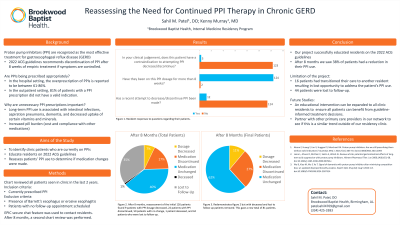Monday Poster Session
Category: Esophagus
P2215 - Reassessing the Need for Continued PPI Therapy in Chronic GERD
Monday, October 28, 2024
10:30 AM - 4:00 PM ET
Location: Exhibit Hall E

Has Audio
.jpg)
Sahil M. Patel, DO
Brookwood Baptist Health
Birmingham, AL
Presenting Author(s)
Sahil M. Patel, DO, Kenny J. Murray, MD, MPH
Brookwood Baptist Health, Birmingham, AL
Introduction: The American College of Gastroenterology (ACG) identifies proton pump inhibitors (PPI) as the most effective treatment for gastroesophageal reflux disease (GERD). Because of the risks associated with long-term PPI use, thought to be due to gastric acid suppression, they recommend either trial discontinuation or as-needed use for GERD patients without Barrett’s esophagus or erosive esophagitis.
Despite these risks, which include intestinal infections, aspiration pneumonia, and decreased uptake of certain vitamins and minerals, many patients remain on PPIs for extended periods, increasing these risks. This study aims to identify clinic patients who are currently on PPIs, educate residents on current ACG guidelines, and reassess patients’ PPI use to determine if medications changes were made.
Methods: We conducted a chart review to identify all patients taking prescription PPIs for chronic GERD, excluding those with Barrett’s esophagus or erosive esophagitis. Via EPIC secure chat, patients’ residents were educated on the 2022 ACG guidelines and then asked a few questions about prior attempts to trial off PPI. After 8 months, a second chart review determined whether patients initially identified were no longer on PPIs, on a lower dose, or had no change in their PPI.
Results: After 8 months, of the initial 126 patients identified, 44 were lost to follow-up and 1 died. Of the remaining 81 patients, 22 (27%) had their PPI discontinued, 9 (11%) had their dosage decrease, and 50 (62%) had no change in their PPI. A limitation of the project was the transition of care of 16 patients to different residents during the project resulting in lost opportunity to address patient’s PPI use.
Discussion: Our project successfully educated residents on the 2022 ACG guidelines for GERD leading to approximately 38% of patients reducing their risk of PPI associated adverse events. The issue of prolonged PPI use without reassessment is likely present in most primary care offices and can easily be mitigated with simple education on the ACG guidelines. In future studies, an educational intervention can be expanded to all clinic residents to ensure all patients can benefit from guideline-informed treatment decisions.
Disclosures:
Sahil M. Patel, DO, Kenny J. Murray, MD, MPH. P2215 - Reassessing the Need for Continued PPI Therapy in Chronic GERD, ACG 2024 Annual Scientific Meeting Abstracts. Philadelphia, PA: American College of Gastroenterology.
Brookwood Baptist Health, Birmingham, AL
Introduction: The American College of Gastroenterology (ACG) identifies proton pump inhibitors (PPI) as the most effective treatment for gastroesophageal reflux disease (GERD). Because of the risks associated with long-term PPI use, thought to be due to gastric acid suppression, they recommend either trial discontinuation or as-needed use for GERD patients without Barrett’s esophagus or erosive esophagitis.
Despite these risks, which include intestinal infections, aspiration pneumonia, and decreased uptake of certain vitamins and minerals, many patients remain on PPIs for extended periods, increasing these risks. This study aims to identify clinic patients who are currently on PPIs, educate residents on current ACG guidelines, and reassess patients’ PPI use to determine if medications changes were made.
Methods: We conducted a chart review to identify all patients taking prescription PPIs for chronic GERD, excluding those with Barrett’s esophagus or erosive esophagitis. Via EPIC secure chat, patients’ residents were educated on the 2022 ACG guidelines and then asked a few questions about prior attempts to trial off PPI. After 8 months, a second chart review determined whether patients initially identified were no longer on PPIs, on a lower dose, or had no change in their PPI.
Results: After 8 months, of the initial 126 patients identified, 44 were lost to follow-up and 1 died. Of the remaining 81 patients, 22 (27%) had their PPI discontinued, 9 (11%) had their dosage decrease, and 50 (62%) had no change in their PPI. A limitation of the project was the transition of care of 16 patients to different residents during the project resulting in lost opportunity to address patient’s PPI use.
Discussion: Our project successfully educated residents on the 2022 ACG guidelines for GERD leading to approximately 38% of patients reducing their risk of PPI associated adverse events. The issue of prolonged PPI use without reassessment is likely present in most primary care offices and can easily be mitigated with simple education on the ACG guidelines. In future studies, an educational intervention can be expanded to all clinic residents to ensure all patients can benefit from guideline-informed treatment decisions.
Disclosures:
Sahil Patel indicated no relevant financial relationships.
Kenny Murray indicated no relevant financial relationships.
Sahil M. Patel, DO, Kenny J. Murray, MD, MPH. P2215 - Reassessing the Need for Continued PPI Therapy in Chronic GERD, ACG 2024 Annual Scientific Meeting Abstracts. Philadelphia, PA: American College of Gastroenterology.

